Become an IDOL 78: Instructional Design Volunteer Project for the Massage Therapy Foundation with Whitney Lowe
Apr 21, 2023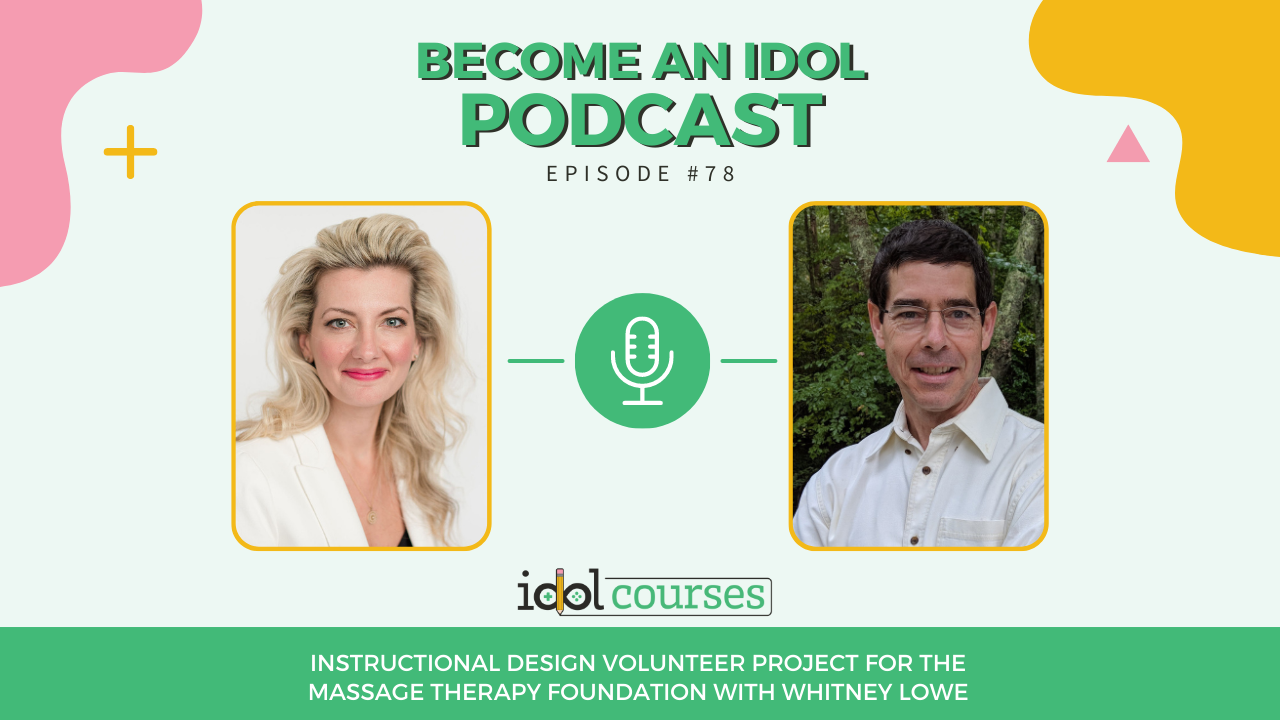
Guest: Whitney Lowe, Massage Educator & Online Learning Developer
In this episode, I'll be chatting with Whitney Lowe. Whitney has been a massage educator for 34 years, and teaching online since 2006. We discuss the IDOL World Project and how he was able to get a volunteer project completed for the Massage Therapy Foundation. If you are a non profit organization check out the IDOL World Project here. We can connect you with our volunteer learning designers.
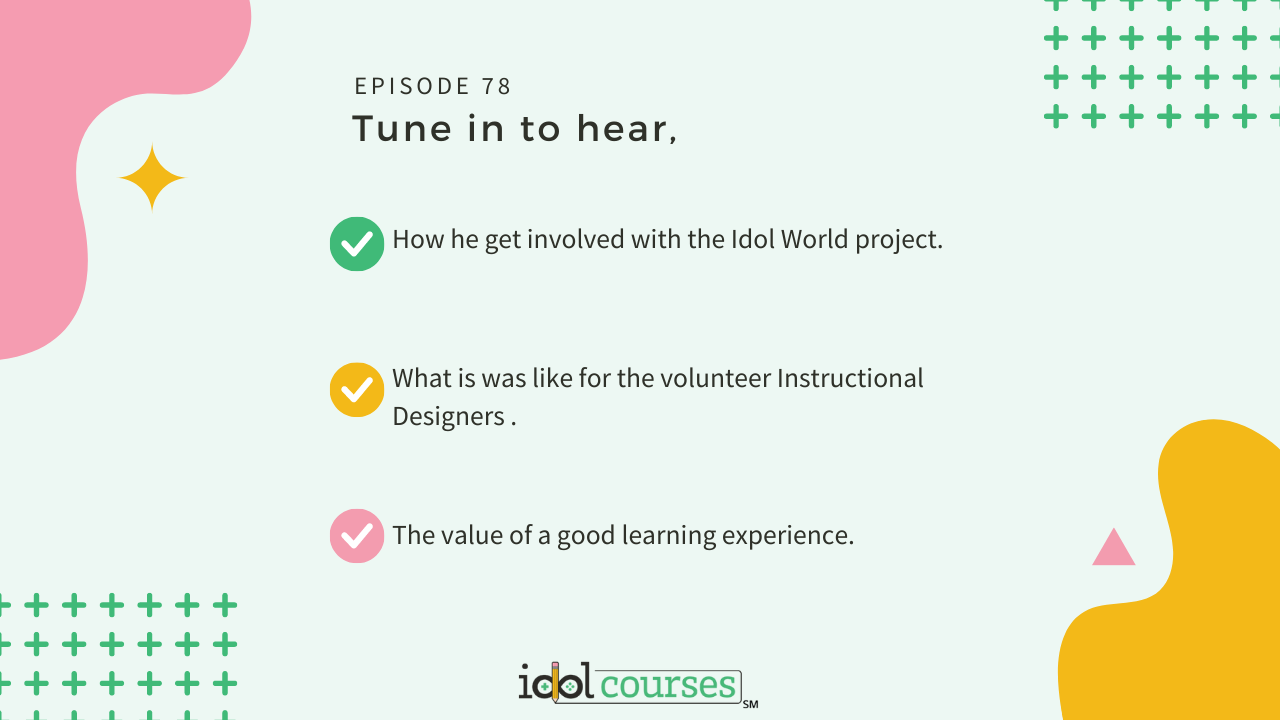
Listen to this episode below:
Subscribe to Become an IDOL Podcast: Apple Podcast | Spotify | Google Podcast
Here's a little more info about Whitney:
He is a subject matter specialist with massage for pain and injury treatments, has authored two books, contributed to multiple others and written hundreds of articles. He hosts a popular podcast (The Thinking Practitioner) and is committed to producing high-quality learning experiences for all his students.
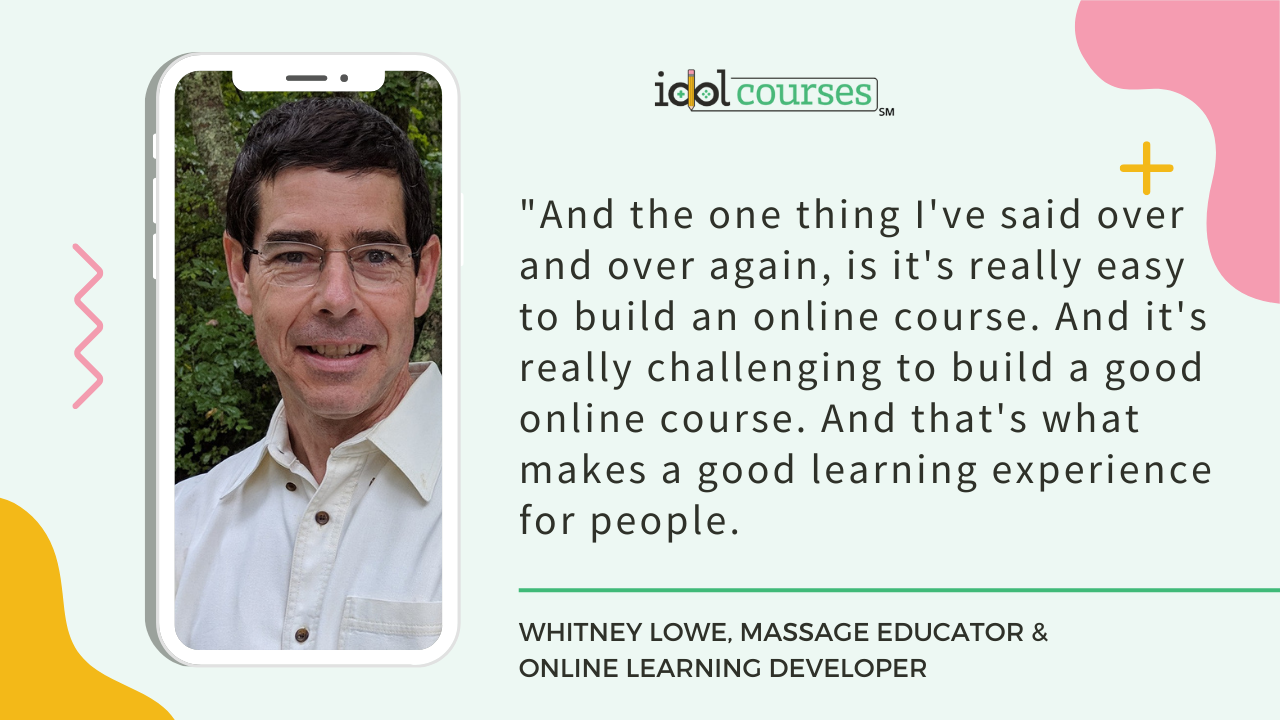
Connect with Whitney: LinkedIn
Enjoy the Episode Transcript below:
Robin Sargent I have here with me today, Whitney Lowe, and Whitney is an business owner. But really I brought Whitney to come talk to us because he recently hired some of our instructional designers as volunteers to work on a very specific volunteer project. And so Whitney, would you do a better job of introducing who you are and your business and a little bit about your background?
Whitney Lowe Sure, my name is Whitney Lowe, and I've been working in the massage therapy world for about 35 years. And started first off as an educator, and a practitioner working with treating pain and injury conditions, and then got very involved with the education side of the business, and got into online education pretty early on, comparatively, this was around the late 90s and early 2000s, looking for ways to try to reach more students across the country and across the globe, who are interested in some of the stuff that we were doing in our courses. And also felt like, the current format that we were using a lot was kind of a two day weekend workshop format. And it was just not really appropriate for teaching a lot of the more complex skills of decision making that we were trying to teach people. And I really thought the online world had a lot of potential for doing that kind of thing and doing it really well. So I started exploring online education a lot at that point and have been involved with it ever since. So I still do teach a lot of in person courses around the country in different outside of the country as well. But my passion really is about online education and trying to make really high quality learning experiences for people.
Robin Sargent And what's the name of the place where people go and take your courses?
Whitney Lowe Yeah, so I'm a director of the Academy of Clinical Massage. That's the name of our business. And we again, produce educational materials and things, mainly emphasizing training massage therapists who are already in practice, more advanced skills and methods for treating pain and injury problems.
Robin Sargent I think we worked together back in 2019, just to do a course review. But then you came back to IDOL courses, because you heard about our IDOL World project, or you just kind of wondered if we had volunteers. How would that work?
Whitney Lowe Yeah. So I mean, this started back, like you said, back in 2019. I mean, I had been following what you were doing with the IDOL Academy a while back and was learning a lot from your podcasts than the other things that you were doing. And I wanted somebody who was a really good instructional designer and understood the field a lot to look at some of the things that I was building with my courses. So I sent some stuff over to you to have you review it, you did a wonderful job of reviewing and giving me some good feedback and input on those courses. And then in recent years, again, listening to some of the things that were going on with the academy and watching a lot of the social media posts from budding instructional designers saying like, I don't have a portfolio, I don't know how to get started doing this, and everybody wants to see something I've done and I had this project that had landed on my plate, from another nonprofit company that is in our professional massage therapy foundation, because I had built a course for them many years ago about the basics of research literacy, which was essentially teaching people how to find appropriate research articles in our field. And we needed to upgrade and redo the course and make it more current. And I just did not have really time and space on my plate to take that project on. And I thought, you know, this is a nonprofit organization here, it would be a great opportunity for one of these IDOL groups to get some skills, learn some things and then have something that could show in their portfolio when they were done. And so I reached out to you and said like, Hey, do you think they'd be interested in this? So that's how we got started.
Robin Sargent And they were interested. And so what did that process look like? How many did you get? Did you onboard them? Walk me through.
Whitney Lowe Yeah, so actually, to be honest, your group took the reins, we had a couple of initial meetings. And we had kind of like a lead person that was mainly running the the organization for the other group there. And we had a couple of initial meetings, and they did a really good job. This was fun to watch the whole process, because they were you know, I told them, I'm going to be the Smee here, in this instance, the subject matter expert and pretend that I'm the company that you're hiring, essentially. And I'll give you a lot of the content, but you all are going to be contributing your ideas for design work for implementation and how that's going to come together. And so we went through the whole process, you know, kind of the analysis of what do you want to get out of this? And what what kinds of things are going to need to be covered? And what kind of assets are you looking to do and how are people going to be viewing this? Is it going to be on mobile devices? Where are people going to be learning it? So we did some initial meetings like that and then we talked over what was going to be the overall build out strategy and I told them a little bit more about the foundation what the organization was about. And the other thing that was really great about this, I didn't get to talk to the group that much about this was, uh, you know, I went, I went to the foundation, I said, Look, I can't do this myself right now. But I've got this great group that I think would really be helpful doing this, they were super juiced and excited about it. And when I got the first curriculum design document back from the IDOL group that had, you know, the whole course layout and all the assets that were going to be and everything like that, I sent it over to the foundation, they were just like, wow, this is incredible. You know, this is great, because they hadn't seen things like that before, from any of the course stuff that had been built with them. So they were very impressed.
Robin Sargent I love it. How many people were volunteers, how many was in the group?
Whitney Lowe We had five in the group total. And we tried, we met several times on Zoom, not everybody was able to get to all the meetings all the time. But we had five people that were total working on the on the project there.
Robin Sargent How did they split up their roles and responsibilities?
Whitney Lowe You know, I don't have a lot of detail about how they were doing. But my understanding was, the way that this was sort of split up was the course was broken up into a certain number of modules that we had had previously. And so what they kind of did was each person took one of those modules, and then sort of fleshed that out in the way that we talked about wanting to do it, but the other thing that was really cool, and you know I talked to them about this early on, I said, I really want to have some degree of cohesion and, and personality that runs through it. And so we came up with this fun little narrative about something that would happen in real life for a massage therapists who is just starting to learn about research. And they made a couple little Vyond videos and things that started at the beginning of each module and took us took us through the story of this person, you know, first learning about some things of why they needed to learn research. And then we made this little sort of game process where she was going to have to do a presentation to a bunch of healthcare professionals. And that involves her having to do a bunch of research to figure out what she needed to do. And so the course was all built around that story. So we tried to get the idea of a story and some kind of interesting engagement there instead of just dumping a bunch of content out there.
Robin Sargent And when did the project start? Because I'm looking to see like, what was the duration of how long you guys worked through this?
Whitney Lowe Yeah, I think I initially reached out to you about this in June, maybe of last year. And it seems like it was around maybe August or so when we had our first meetings with the group. And then they did all the content building throughout the fall, and then turned all the assets and finished course modules and everything over to me. And we had, you know, of course, several iterations of tweaks and improvements and updates and figuring things out as we did some feedback cycles. And all this stuff was turned over to me just at the beginning of this year in early January. So about three- four months. Yeah it was. And, you know, I was just super impressed with the way that we set some timelines up, which were kind of some ambitious timelines for getting this thing done. And everybody met those timelines, and they had all their work to put together. And they stayed in touch with me a great deal during that whole process, and really kept me in the loop about what they were doing, and then asked for some further clarifications. And they were super open to all the feedback I had, you know, when they put some stuff together and said, like, you know, that's kind of interesting, but that wouldn't really happen in the massage world. So that was helpful to be able to shape some things to really make it realistic for everybody as well.
Robin Sargent You know, that's the thing that usually when people try to get volunteers to come and do things for them, they feel like they have to chase them down or like people disappear from the project, or they don't meet deadlines. But that doesn't sound like your experience.
Whitney Lowe No, I had a great experience with this group. And I would have to highly recommend it to anybody else to look to do something like that. It was a wonderful experience working with everybody. And I think that was a good experience for everybody else there. The deadlines that I gave them were kind of artificial, in that, we didn't have a specific timeframe, but they were kind of on on my, you know, the weighing on me a little bit because the foundation had talked me back in January of last year about redoing this course. So I was kind of like, yeah, we need to get this done. So this was working through the Christmas holidays, and all that kind of thing as well. So I was quite impressed that everybody met this deadlines and put together really good work as part of it as well.
Robin Sargent And so you eventually shipped it to the foundation and what was what was their feedback?
Whitney Lowe Well, this is where we are right now. I'm still doing the final tweaks on everything and some stuff has been sent over to them. So they're in the review process now. And then we will probably be going live with the course in about another maybe a week or two. So we're in the very final stages of everything. And so far, it's been very well received by everybody looking at it.
Robin Sargent Oh my gosh. And so what is it that you think is like the biggest takeaway from just this whole experience or like what you'd want to share with other people?
Whitney Lowe One of the things that I would say is that you know, for especially for a lot of people who are interested in getting involved.
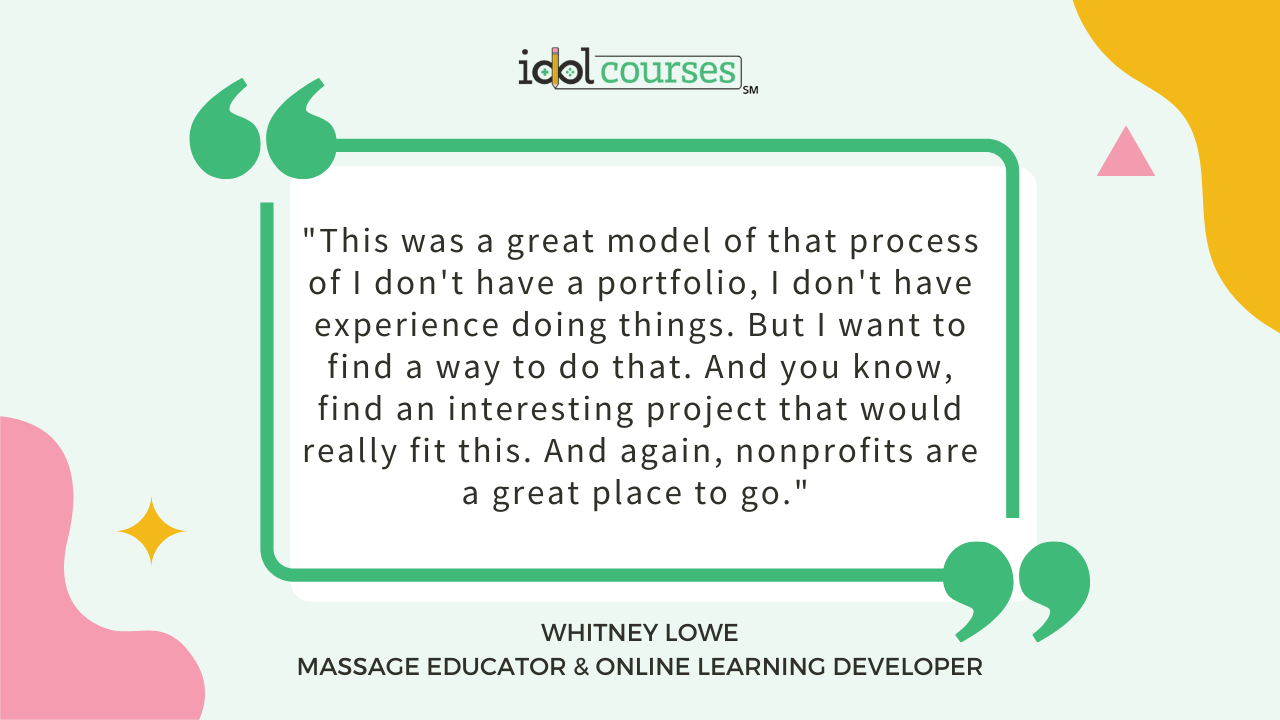 They can't generally afford to hire people to do things. And then everybody who worked on this, the agreement was you get to have this stuff as assets you put in your portfolio and share and show people about what you've done. So it was a win win all around for everybody. And I just, I had such a good experience with it, I really would encourage other people to try to pursue that process as well.
They can't generally afford to hire people to do things. And then everybody who worked on this, the agreement was you get to have this stuff as assets you put in your portfolio and share and show people about what you've done. So it was a win win all around for everybody. And I just, I had such a good experience with it, I really would encourage other people to try to pursue that process as well.
Robin Sargent And so you've been in the instructional design world, one foot in there, and then one foot and your core subject matter expertise, which is massage therapy. And so I always ask people, when we end our show, what's some of your best advice for those who are looking to become an IDOL?
Whitney Lowe Yeah, you know, I would just say, people tend to gravitate towards doing this because they're interested in education generally, and interested in wanting to do some things. And the one thing that I would say is that spending the time learning about quality instructional design really pays off. Because there's just, this is one thing that I've done a lot of presentations in our field for years about online education. And the one thing I've said over and over again, is it, it's really easy to build an online course. And it's really challenging to build a good online course. And that's what makes a good learning experience for people. And a lot of times people are these days looking for a better quality experience. Because, you know, we're just all tired of kind of like, looking at PDFs and just, you know, watch this video, click through this group of slides and answer a question kind of thing. We're kind of done with that. So the more you can really delve into some of those things. And to me, you know, and I worked with this group a good bit on some of these things, too, because I have spent a lot of years studying instructional design concepts and you know, came back with them with even feedback on things like, look, when you're writing multiple choice questions, here's a couple of things that you might want to think about to make these questions, better quality questions, better learning experiences, and less confusing and things like that. And, and sometimes these are fine points that people don't really delve into a lot. But every little bit of those things makes a good course makes it makes the course much better in the long run.
Robin Sargent And really, they got through that volunteer experience, not only did they get for their portfolio, not only did they get the experience working through the process, but they were learning through the feedback off of you and your subject matter expertise. But your expertise isn't just massage therapy, it also is online education. And so it was another continuation of their journey to really hone the skills, right, because you don't really know what you're missing until you try it out.
Whitney Lowe I think that's really true. And and I hope it was a valuable learning experience for all and they all said that they got good things out of it. And I hope those were some things that will help them and working with other subject matter experts, as they you know, work in the professions on down the road as well. But in terms of building those kinds of skills, the teamwork was also really helpful. Because each person that was on the team brought some slightly different skill set there and one person was a little stronger on graphic design, one person is a little stronger on digging into content, finding good resources on the web, or whatever it was, each person on the team brought things to that. And that's one of the the benefits of of a cohort group and a team project like this is it really allows people to have a lot more enriching learning experiences from each other.
Robin Sargent I just love it. Thank you so much, Whitney, not only, of course, her coming on the podcast, but for taking the chance and reaching out to us and bringing in our volunteers to come and help you in the foundation, build this education for a good cause. And so I really appreciate you.
Whitney Lowe Yeah, absolutely. And I will continue to put the word out there that this is a great project to for people who might be doing that and something I think it really helps people who are in the IDOL Academy learn a lot more and have a great learning experience as well.
Robin Sargent Thank you so much for listening. You can find the show notes for this episode at idolcourses.com. If you liked this podcast and you want to become an instructional designer, an online learning developer, join me in the IDOL courses Academy, where you'll learn to build all the assets you need to land your first instructional design job, early access to this podcast tutorials for how to use the elearning authoring tools, templates for everything course building and paid instructional design experience opportunities, go to idolcourses.com forward slash academy and enroll or get on the waitlist. Now get out there and build transcendent courses.
Thank you so much for reading the show notes for this episode. If you enjoyed this episode, you may like:
Volunteering: ID Experience through Non-profits
Practical Way to Build Your Confidence: No Need to Fake It
If you are a new listener to Become an IDOL, we would love to hear from you. Please visit our Contact Page and let us know how we can help you today!
Subscribe & Review in iTunes
Are you subscribed to my podcast? If you’re not, I want to encourage you to do that today. I don’t want you to miss an episode. I'll be publishing a new episode every two weeks and if you’re not subscribed there’s a good chance you’ll miss out on those. Click here to subscribe in iTunes!
Now if you’re feeling extra loving, I would be really grateful if you left me a review over on iTunes, too. Those reviews help other people find my podcast and they’re also fun for me to go in and read. Just click here to review, select “Ratings and Reviews” and “Write a Review” and let me know what your favorite part of the podcast is. Thank you!
Want more tips on how to become an IDOL? Get my free guide here
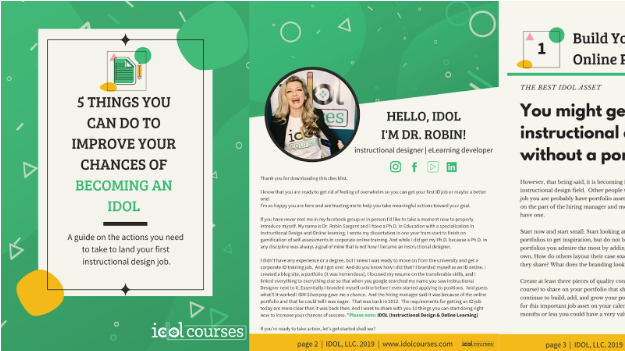
Join the Conversation!
We have a wonderful and friendly community of expert and novice IDOLs in the Become an IDOL Facebook Group. We would love to have you join us in the group or chat with IDOL courses on of our social media channels.
Stay connected with news and updates!
Join our mailing list to receive the latest news and updates from our team.
Don't worry, your information will not be shared.
We hate SPAM. We will never sell your information, for any reason.


